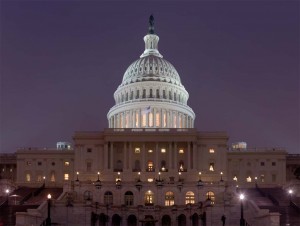Federal workers furloughed as a result of Washington’s budget impasse could catch a bit of a break, at least if they own a Hyundai, the Korean maker offering to defer all auto loan and lease payments for owners who are, for now, out of work.
The shutdown of all but essential government offices will impact more than 800,000 federal workers. It’s unclear just how many of those might now have to defer plans to buy a new car, but auto industry officials are warning the federal shutdown could have a significant impact on what had been a strong recovery of the U.S. car market – especially if the political logjam drags on for more than a short while.
“We’re all concerned,” Ken Czubay, head of U.S. marketing, sales and service at Ford, said during a conference call discussion of September automotive sales. “We’re going to have to evaluate how long it’s going to last, and we’ll take the appropriate measures depending on the length of the activity in Washington.”
For his part, Czubay’s counterpart at General Motors said he had “faith that the right things will be done and done quickly” to resolve the budget dispute, but Kurt McNeil, GM’s vice president of U.S. sales operations warned that, “If the thing drags out a couple weeks, then…it starts to have a bigger factor on business.”
The real concern, McNeil and others agreed, is what sort of impact the shutdown will have on consumer confidence. Fearful consumers steered clear of big-ticket purchases during the depths of the Great Recession, sending the auto and housing industries into their worst downturns in decades. Automotive sales have been riding a wave of rising consumer confidence in recent months. Adding momentum to car sales has been a surge in housing which, in turn, has encouraged contractors to replace aging vans and pickups.
(September car sales take a tumble. Click Here to see what happened.)
September car sales marked the industry’s first year-over-year decline in 27 months and provided a chilling hint of what might happen if the economy – and consumer confidence – falters in the wake of an extended government shutdown.
Automakers did feel some impact the last time there was a partial government shutdown – for a week in mid-November 1995 and then from December 16 through January 6, 1996 — sales falling 3.2% in December 1995 and 2% for the entire year.
Some analysts suggest that the recovery of the automotive market – like that of the rest of the economy – was slowed down when a possible government shutdown was threatened in August 2011, which is why Ford Motor Senior Economist Jenny Lin said, “We urge our government leaders to continue to work together and we hope the shutdown will not be very long.”
(Global auto industry rebounds – but is it sustainable? Click Hereto find out.)
But manufacturers are hopeful that the economy has strengthened enough to withstand the impact from this week’s shutdown, at least if remains a brief one.
“We have a lot of strong fundamentals to support continued improving automotive sales,” said GM senior economist Sue Yingzi Su.
For his part, senior analyst Alec Gutierrez, of Kelley Blue Book, saw September as more an accounting fluke than a real industry setback – noting that sales associated with the Labor Day holiday were counted in August, rather than September. But October could take a real hit, he stressed, as “a prolonged government shutdown could stand in the way of the ongoing recovery.”
This is not the first time Hyundai has taken steps to respond when customers were out of work. It also offered a program covering payments for unemployed owners during the depths of this past recession. Several automakers, including Ford have taken steps to help workers hurt by Hurricane Sandy and other disasters. Whether they will also weigh in with programs for furloughed federal employees remains to be seen. For now, however, industry planners are hoping the crisis in Washington will be short enough they don’t need to step in.

